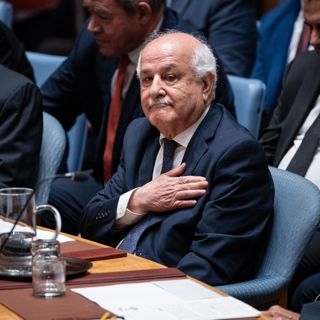
The ‘Most Damning’ Impeachment Testimony Yet
The Democrats leading the impeachment inquiry are calling testimony from the acting envoy to Ukraine the “most damning” yet, implicating President Trump himself in a quid pro quo over military aid to the country. William B. Taylor Jr., a career diplomat who has served under both Democratic and Republican administrations, prepared a 15-page opening statement for investigators on Tuesday. He described his testimony as “a rancorous story about whistle-blowers, Mr. Giuliani, side channels, quid pro quos, corruption and interference in elections.” In his statement, Mr. Taylor documented two divergent channels of United States policymaking in Ukraine, “one regular and one highly irregular.” He said Mr. Trump had used the shadow channel to make America’s relationship with Ukraine — including a $391 million aid package — conditional on its government’s willingness to investigate one of his political rivals, former Vice President Joseph R. Biden Jr., and his family. The question of a quid pro quo for the military aid has been pursued by House Democrats since the beginning of the impeachment inquiry. In Mr. Taylor, investigators have a former ambassador testifying under oath that the allegations are true. Guest: Nicholas Fandos, who covers Congress for The New York Times. For more information on today’s episode, visit nytimes.com/thedaily.Background coverage: Here are six key takeaways from Mr. Taylor’s opening statement to impeachment investigators.This is the evidence collected and requested in the impeachment inquiry so far. Subscribe today at nytimes.com/podcasts or on Apple Podcasts and Spotify. You can also subscribe via your favorite podcast app here https://www.nytimes.com/activate-access/audio?source=podcatcher. For more podcasts and narrated articles, download The New York Times app at nytimes.com/app.
23 Okt 201920min

Trapped in Syria, Part 2: A Plea to Parliament
Yesterday on “The Daily,” we met Kamalle Dabboussy, who said his daughter had been tricked by her husband into joining the Islamic State. His daughter and three grandchildren are being held in a Syrian detention camp for the relatives of ISIS fighters.When we left off, Mr. Dabboussy had just received a call from a journalist that suggested his family’s situation was about to become far more precarious. President Trump had announced that he would withdraw U.S. troops from the Syrian border, and Kurdish forces who had been guarding the prisons were expected to abandon their posts, leaving the detainees’ lives in imminent danger.Today, we follow Mr. Dabboussy’s struggle to convince the Australian government that his daughter and her children are worth saving — despite their ties to the Islamic State.Guest: Livia Albeck-Ripka, a reporter for The Times in Melbourne, Australia, spoke with Kamalle Dabboussy, whose daughter Mariam is trapped in Syria with her children. For more information on today’s episode, visit nytimes.com/thedaily. Background coverage: Here’s the first episode in this two-part series, in which we introduced Kamalle Dabboussy and his fight to bring his family home from a war zone.Mr. Dabboussy is one of a cohort of parents in Australia lobbying the government to help release their loved ones from detention camps in northern Syria. Subscribe today at nytimes.com/podcasts or on Apple Podcasts and Spotify. You can also subscribe via your favorite podcast app here https://www.nytimes.com/activate-access/audio?source=podcatcher. For more podcasts and narrated articles, download The New York Times app at nytimes.com/app.
22 Okt 201932min

Trapped in Syria, Part 1: A Father’s Fight
Since the fall of the Islamic State, many of the group’s fighters and their families have been held in prison camps controlled by U.S.-allied Kurdish forces. Parents around the world have been trying to get their children and grandchildren out of the camps and back to their home countries. Now, the fate of those detainees has become an urgent question after President Trump’s abrupt recall of American troops from the Syrian border. We follow one father as he fights to get his daughter, a former ISIS bride, and her children back to Australia.Guest: Livia Albeck-Ripka, a reporter for The Times in Melbourne, Australia, spoke to Kamalle Dabboussy, whose daughter Mariam is trapped in Syria with her three children. For more information on today’s episode, visit nytimes.com/thedaily. Background coverage: “There will be ethnic cleansing of the Kurdish people from Syria, and the American administration will be responsible for it,” said Mazlum Kobani, a Kurdish military commander, when asked about a full American withdrawal from northern Syria.President Trump is now said to be considering leaving a few hundred troops in eastern Syria to defend against an ISIS resurgence. Subscribe today at nytimes.com/podcasts or on Apple Podcasts and Spotify. You can also subscribe via your favorite podcast app here https://www.nytimes.com/activate-access/audio?source=podcatcher. For more podcasts and narrated articles, download The New York Times app at nytimes.com/app.
21 Okt 201927min

The Week Diplomats Broke Their Silence
Members of the American diplomatic corps testified about the state of U.S. foreign policy in private hearings on Capitol Hill this week. According to our national political correspondent, their testimonies revealed “a remarkably consistent story” about the ways in which career diplomats have been sidelined to make room for Trump administration officials. The conduct of those officials, and the nature of the directives they received, is at the center of the House impeachment investigation.We look back at a week inside the U.S. Capitol as that inquiry enters a pivotal phase. Guest: Nicholas Fandos, who covers Congress for The New York Times. For more information on today’s episode, visit nytimes.com/thedaily. Background coverage: Gordon D. Sondland, the U.S. ambassador to the European Union, told impeachment investigators on Thursday that President Trump delegated Ukraine policy to his personal lawyer Rudolph Giuliani.Mick Mulvaney, the acting White House chief of staff, threw Washington into turmoil on Thursday when he first confirmed, then retracted, that Mr. Trump had withheld military aid to pressure Ukraine. Subscribe today at nytimes.com/podcasts or on Apple Podcasts and Spotify. You can also subscribe via your favorite podcast app here https://www.nytimes.com/activate-access/audio?source=podcatcher. For more podcasts and narrated articles, download The New York Times app at nytimes.com/app.
18 Okt 201936min

A Foreseen Calamity in Syria
The presence of U.S. troops in northern Syria was designed to protect America’s allies and keep its enemies there in check. President Trump’s unilateral withdrawal from the region quickly, and predictably, unraveled a tenuous peace on the volatile border between Syria and Turkey. His decision handed a gift to four American adversaries: Iran, Russia, the Syrian government and the Islamic State. David E. Sanger of The Times explains why “the worst-case scenario is even worse than you can imagine.” Guest: David E. Sanger, a national security correspondent and a senior writer at The New York Times. For more information on today’s episode, visit nytimes.com/thedaily. Background coverage:President Trump lashed out in defense of his decision to remove U.S. troops from northeastern Syria in response to rare bipartisan condemnation from Congress.Russian troops have already occupied abandoned American outposts in Syria as Moscow moves to fill the power vacuum.“Don't be a fool! I will call you later.” Read the letter President Trump sent to Turkey’s leader. Subscribe today at nytimes.com/podcasts or on Apple Podcasts and Spotify. You can also subscribe via your favorite podcast app here https://www.nytimes.com/activate-access/audio?source=podcatcher. For more podcasts and narrated articles, download The New York Times app at nytimes.com/app.
17 Okt 201927min

The Moderates Strike Back: The 4th Democratic Debate
Last night in Ohio, The New York Times co-hosted a presidential debate for the first time in more than a decade. Marc Lacey, The Times’s National editor, moderated the event with the CNN anchors Erin Burnett and Anderson Cooper.It was also the first debate since Democrats started an impeachment inquiry into President Trump and his efforts to pressure Ukraine to investigate former Vice President Joseph R. Biden Jr. Candidates denounced the president, calling for his impeachment, without wading into the specifics of the investigation. Instead, moderates focused on winning over Biden voters by differentiating themselves from more progressive candidates. Guests: Alexander Burns, who covers national politics for The Times, and Maggie Haberman, who covers the White House. For more information on today’s episode, visit nytimes.com/thedaily. Background coverage: Senator Elizabeth Warren was the primary target of moderates’ attacks, illustrating her status as an emergent front-runner. Candidates avoided criticism of Joe Biden, wary of echoing President Trump’s attacks on his family.Here are six takeaways from the debate. Subscribe today at nytimes.com/podcasts or on Apple Podcasts and Spotify. You can also subscribe via your favorite podcast app here https://www.nytimes.com/activate-access/audio?source=podcatcher. For more podcasts and narrated articles, download The New York Times app at nytimes.com/app.
16 Okt 201929min

The Effort to Discredit the U.S. Ambassador to Ukraine
This week, we’re producing episodes of “The Daily” from The New York Times’s Washington bureau. The impeachment inquiry is entering a pivotal phase as Congress returns from recess. The White House’s strategy to block the investigation is beginning to crumble, with five administration officials set to testify before House investigators.On Monday, those committees heard testimony about why the president removed the longtime ambassador, Marie L. Yovanovitch, just two months before the call in which he asked the Ukrainian president for a favor. Today, we look at how Ms. Yovanovitch ended up at the center of the impeachment process. Guests: Sharon LaFraniere, an investigative reporter based in Washington, and Rachel Quester and Clare Toeniskoetter, producers for “The Daily.” For more information on today’s episode, visit nytimes.com/thedaily. Background coverage: Marie L. Yovanovitch told House investigators that she was removed from office on the basis of “false claims by people with clearly questionable motives.” The effort to pressure Ukraine so alarmed John Bolton, then the national security adviser, that he told an aide to alert White House lawyers. “Giuliani’s a hand grenade who’s going to blow everybody up,” an aide quoted him as saying of President Trump’s personal lawyer. Subscribe today at nytimes.com/podcasts or on Apple Podcasts and Spotify. You can also subscribe via your favorite podcast app here https://www.nytimes.com/activate-access/audio?source=podcatcher. For more podcasts and narrated articles, download The New York Times app at nytimes.com/app.
15 Okt 201925min

The Story of a Kurdish General
Turkey has invaded Kurdish-controlled territory in Syria, upending a fragile peace in the region and inciting sectarian bloodshed. The Trump administration has ordered a full evacuation of the 1,000 American troops that remain in northeastern Syria, leaving Mazlum Kobani, the commander of the Kurdish-led militia, and his forces to rely on Russia and Syria for military assistance.Who are the Kurds? How is it that Kurdish fighters came to be seen as allies to the United States and terrorists to Turkey? And what would the fall of Kurdish territory in northeastern Syria mean for the region?Guest: Ben Hubbard, Beirut bureau chief for The New York Times. For more information on today’s episode, visit nytimes.com/thedaily. Background coverage: Turkey’s invasion upended a fragile peace and risks enabling the resurgence of the Islamic State.American troops who fought alongside Kurdish allies have expressed regret after the U.S. abandoned posts in northeastern Syria. “It’s a stain on the American conscience,” one Army officer said. Subscribe today at nytimes.com/podcasts or on Apple Podcasts and Spotify. You can also subscribe via your favorite podcast app here https://www.nytimes.com/activate-access/audio?source=podcatcher. For more podcasts and narrated articles, download The New York Times app at nytimes.com/app.
14 Okt 201924min






















